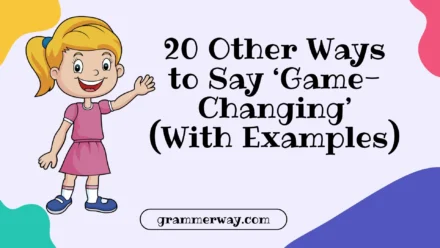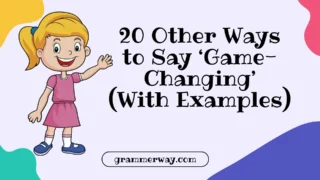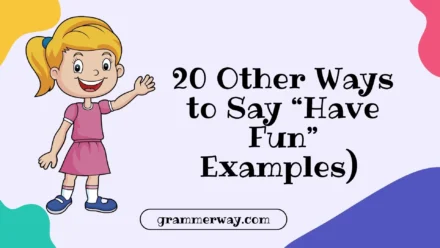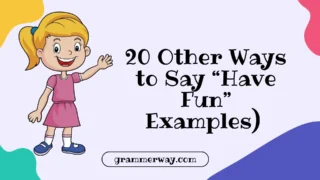Finding the right words to express joy and appreciation can make your messages feel more warm, personal, and memorable. Instead of simply saying “I had a great time,” there are many thoughtful and expressive ways to show that you truly enjoyed someone’s company or an experience. Using other ways to say “I had a great time” helps your words sound more genuine, heartfelt, and unique—especially when you want to connect deeply with someone or leave a lasting impression.
What Does “I Had a Great Time” Mean?
When someone says “I had a great time,” they’re expressing happiness, enjoyment, or satisfaction after spending time with someone or participating in an activity. It’s a phrase that shows appreciation for the shared experience and a sense of warmth toward the moment. Essentially, it’s a polite and kind way to say that the event or interaction brought you joy and positivity.
Is It Professional or Polite to Say “I Had a Great Time”?
Yes, “I had a great time” is both polite and professional in most settings. It can be used after a meeting, dinner, or social gathering to show gratitude and enthusiasm. However, for professional situations, you might choose slightly more formal alternatives like “I truly enjoyed our meeting” or “It was a pleasure spending time with you.” These variations convey respect and professionalism while still expressing warmth and sincerity.
Synonyms for “I Had a Great Time”
- I really enjoyed myself
- I had so much fun
- I loved spending time with you
- I truly enjoyed our time together
- That was such a wonderful experience
- I had an amazing time
- I couldn’t have asked for a better time
- I had the best time ever
- I really appreciated the time we spent together
- I had a blast
- I really had a lovely time
- I thoroughly enjoyed it
- I had such a memorable day
- I had the most wonderful evening
- I really valued our time together
- I had an unforgettable experience
- I truly cherished every moment
- I had a fantastic time
- I had such a joyful experience
- I had a heartwarming time
1. Let’s Get Started
Meaning: This phrase shows readiness to begin and invites others to take the first step together.
Scenario: Perfect for meetings, teamwork, or starting group tasks.
Examples:
- Let’s get started on the new design project today.
- It’s time to get started on our weekend plans!
- Before we talk too long, let’s get started with the agenda.
- I’m excited about this new idea — let’s get started.
- We’ve talked enough about it, now it’s time to get started.
Tone: Friendly, professional, and motivational.
Explanation: This is a simple and polite way to begin something together. It sounds inclusive and action-focused, without being overly casual.
2. Let’s Begin
Meaning: A calm, polite, and direct way to start a task or activity.
Scenario: Best used in formal settings or presentations.
Examples:
- Let’s begin with a short introduction.
- If everyone’s ready, let’s begin.
- Let’s begin the next chapter of our plan.
- It’s time to stop waiting — let’s begin.
- Alright team, let’s begin our journey together.
Tone: Polite, formal, and inviting.
Explanation: This phrase works beautifully in meetings, classes, or speeches where you want to sound clear and respectful.
3. Let’s Move Forward
Meaning: Expresses progress, confidence, and a positive next step.
Scenario: Common in work or project-related discussions.
Examples:
- We’ve agreed on the plan, so let’s move forward.
- It’s time to move forward with confidence.
- Let’s move forward and see where this takes us.
- Our team is ready, so let’s move forward together.
- The discussion was great — now let’s move forward.
Tone: Professional, confident, and goal-oriented.
Explanation: Ideal when you want to inspire action while maintaining a professional and organized tone.
4. I’m In
Meaning: Shows enthusiasm and personal commitment to an idea or plan.
Scenario: Great for informal chats, teamwork, or group decisions.
Examples:
- Count me in — I’m in!
- If you’re serious about this project, I’m in.
- Sounds fun — I’m in!
- You can trust me on this — I’m in.
- Once you decide, just know I’m in.
Tone: Casual, energetic, and supportive.
Explanation: This phrase shows solidarity and excitement while feeling natural and personal.
5. Let’s Make It Happen
Meaning: Expresses determination and confidence in achieving a goal.
Scenario: Ideal for motivational settings, teamwork, or business environments.
Examples:
- We’ve got the skills — let’s make it happen!
- Let’s make it happen and prove what we can do.
- I believe in this project — let’s make it happen.
- No more waiting, let’s make it happen today.
- With teamwork and effort, let’s make it happen.
Tone: Motivational, inspiring, and confident.
Explanation: Encourages team unity and commitment to action, making it ideal for leaders or team builders.
6. Time to Go For It
Meaning: Encourages bravery and action toward a goal.
Scenario: Works well before starting something challenging.
Examples:
- We’ve planned enough — time to go for it!
- You’re ready, now go for it.
- Let’s stop hesitating — time to go for it.
- Everyone’s counting on us, so let’s go for it.
- This is our moment — let’s go for it!
Tone: Exciting, bold, and supportive.
Explanation: This phrase helps motivate and energize people before taking a big leap or new opportunity.
7. We’ve Got This
Meaning: Expresses confidence and reassurance that success is possible.
Scenario: Ideal when encouraging others before a challenge.
Examples:
- Don’t stress — we’ve got this.
- It looks tough, but we’ve got this together.
- Keep calm, we’ve got this handled.
- We’ve prepared well, so we’ve got this.
- Trust the process — we’ve got this!
Tone: Supportive, positive, and caring.
Explanation: This phrase shows belief in teamwork and builds emotional confidence in others.
8. Let’s Dive In
Meaning: Encourages starting something exciting with full focus and energy.
Scenario: Great for creative projects or brainstorming.
Examples:
- The topic’s fascinating — let’s dive in!
- Let’s dive in and see what we find.
- Enough planning, let’s dive in.
- Ready to explore? Let’s dive in together.
- It’s time to learn something new — let’s dive in.
Tone: Curious, energetic, and creative.
Explanation: Perfect for enthusiastic beginnings, showing readiness and curiosity.
9. Shall We?
Meaning: A polite invitation to start something together.
Scenario: Works best in polite or formal conversations.
Examples:
- Everything’s ready — shall we?
- If everyone agrees, shall we begin?
- Shall we move forward with the plan?
- Sounds perfect, shall we?
- We’re all set — shall we get started?
Tone: Gentle, polite, and cooperative.
Explanation: A refined and respectful way to express readiness and inclusion.
10. Let’s Kick Things Off
Meaning: A lively way to begin something exciting or important.
Scenario: Common in team meetings or events.
Examples:
- Welcome, everyone — let’s kick things off!
- It’s time to kick things off with enthusiasm.
- Ready to start? Let’s kick things off now.
- The wait’s over — let’s kick things off together.
- Let’s kick things off and make it great.
Tone: Friendly, energetic, and team-spirited.
Explanation: Great for setting a positive tone before beginning group activities or meetings.
11. Let’s Get to Work
Meaning: This phrase expresses a direct and energetic intention to start a task or focus on productivity.
Scenario: Ideal for workplaces, study sessions, or collaborative team projects.
Examples:
- We’ve got a busy day ahead, so let’s get to work!
- Everyone’s ready — let’s get to work and make this happen.
- The deadline’s close, so let’s get to work.
- We’ve talked enough — now let’s get to work.
- I love this energy — let’s get to work together.
Tone: Motivational, professional, and action-oriented.
Explanation: This phrase is great when you want to encourage focus and productivity while maintaining a positive and determined tone. It works beautifully in team settings or leadership conversations.
12. Let’s Take Action
Meaning: Encourages people to stop discussing and start doing something practical.
Scenario: Perfect for business meetings, planning sessions, or group motivation.
Examples:
- It’s time to stop planning and take action.
- We’ve talked about change — now let’s take action.
- Let’s take action and make our vision real.
- If we believe in it, then let’s take action.
- Talk is done — let’s take action together.
Tone: Inspiring, proactive, and assertive.
Explanation: This phrase highlights determination and initiative. It’s perfect when you want to show that you’re ready to lead and make things happen.
13. Let’s Make a Start
Meaning: A calm and polite way to begin something, often used in professional or neutral settings.
Scenario: Works well at the beginning of meetings, lessons, or projects.
Examples:
- Alright, everyone — let’s make a start.
- If there are no more questions, let’s make a start.
- It’s getting late, so let’s make a start now.
- We’re all ready, so let’s make a start together.
- Everything’s prepared — let’s make a start.
Tone: Gentle, formal, and encouraging.
Explanation: This phrase strikes the perfect balance between polite and proactive. It’s especially helpful when you want to sound considerate but decisive.
14. Let’s Jump In
Meaning: Suggests starting something with enthusiasm and courage, often without hesitation.
Scenario: Great for creative meetings, group brainstorming, or team-building moments.
Examples:
- This idea sounds fun — let’s jump in!
- No need to wait — let’s jump in and see how it goes.
- Everyone’s excited, so let’s jump in together.
- Let’s jump in and try something new.
- We’ll learn as we go — let’s jump in!
Tone: Energetic, encouraging, and adventurous.
Explanation: This phrase feels spontaneous and lively, making it perfect for moments when you want to spark creativity or enthusiasm within your group.
15. Let’s Roll
Meaning: A cool, casual, and confident way to express readiness and teamwork.
Scenario: Common among friends, colleagues, or sports teams.
Examples:
- Everyone’s ready? Great — let’s roll!
- Grab your things — let’s roll.
- We’ve got everything set — let’s roll into this.
- The plan’s clear, so let’s roll together.
- I’m all set — let’s roll!
Tone: Casual, upbeat, and positive.
Explanation: “Let’s roll” adds a friendly and fearless vibe. It’s great when you want to sound easygoing yet motivated among peers or friends.
16. Time to Begin
Meaning: A simple and clear phrase that marks the start of an activity or task.
Scenario: Perfect for teachers, presenters, or team leaders.
Examples:
- Everyone’s here, so it’s time to begin.
- The clock’s ticking — time to begin.
- Time to begin this exciting journey.
- We’ve prepared enough — time to begin.
- Let’s take a deep breath — time to begin now.
Tone: Calm, respectful, and confident.
Explanation: This phrase has a balanced tone, suitable for both formal and casual use. It’s ideal when you want to encourage a smooth, focused start.
17. Let’s Go Ahead
Meaning: Indicates permission or readiness to continue or start a process.
Scenario: Often used in professional meetings or teamwork contexts.
Examples:
- Everything looks good — let’s go ahead.
- If no one has objections, let’s go ahead with the plan.
- We’ve double-checked, so let’s go ahead confidently.
- The manager approved it — let’s go ahead.
- We’re ready to move — let’s go ahead together.
Tone: Professional, confident, and positive.
Explanation: “Let’s go ahead” is a smart and polished alternative that works well when you want to show leadership and decisiveness in your speech.
18. Let’s Give It a Try
Meaning: Encourages experimentation or trying something new without fear.
Scenario: Great for new ideas, group challenges, or learning experiences.
Examples:
- We don’t know until we try — let’s give it a try.
- Sounds interesting, so let’s give it a try.
- There’s nothing to lose — let’s give it a try together.
- The idea’s bold, but let’s give it a try.
- Don’t overthink it — let’s give it a try.
Tone: Encouraging, open-minded, and positive.
Explanation: This phrase helps others feel safe and supported when taking a risk. It’s both uplifting and confidence-boosting, perfect for team or mentoring situations.
19. Let’s Get Moving
Meaning: Signals it’s time to take action and avoid delay.
Scenario: Works well in both personal and professional settings when encouraging urgency.
Examples:
- We’ve got lots to do, so let’s get moving.
- The event starts soon — let’s get moving now!
- Let’s get moving before the deadline hits.
- Time’s short, so let’s get moving together.
- Don’t wait around — let’s get moving.
Tone: Energetic, practical, and slightly urgent.
Explanation: This phrase is ideal when you want to motivate quick action without sounding harsh. It keeps things positive yet focused.
20. Let’s Take the First Step
Meaning: Encourages starting something meaningful, even if progress is small.
Scenario: Excellent for motivational talks, personal growth, or supportive conversations.
Examples:
- Every journey begins here — let’s take the first step.
- It might be hard, but let’s take the first step together.
- We don’t need perfection — just take the first step.
- This is our time — let’s take the first step now.
- Change starts small — let’s take the first step.
Tone: Encouraging, empathetic, and hopeful.
Explanation: This phrase carries a deep emotional warmth. It’s perfect when you want to inspire courage or hope, especially during new beginnings or life transitions.
Conclusion
Choosing the right words can change the energy of any conversation. Instead of simply saying “Let’s do this,” you can use these thoughtful alternatives to express motivation, kindness, or teamwork in a way that truly fits the moment. Whether you’re starting a meeting, project, or adventure, using phrases like “Let’s make it happen,” “We’ve got this,” or “Let’s take the first step” can make your message sound more human, caring, and connected.
FAQs
1. What is the best professional alternative to “Let’s do this”?
“Let’s move forward” or “Let’s get started” are perfect for professional settings where you want to sound both confident and respectful.
2. What’s a fun, casual way to say it with friends?
Try “Let’s roll” or “I’m in” — they sound friendly and natural in everyday conversations.
3. How can I sound more motivational?
Use “Let’s make it happen” or “We’ve got this” — they express confidence and teamwork beautifully.
4. Which alternative fits a leadership setting?
“Let’s take action” or “Let’s go ahead” show authority and inspire progress among teams.
5. Can I use these phrases in emails or presentations?
Yes! For formal tone, use “Let’s begin,” “Let’s move forward,” or “Let’s make a start.” For casual settings, use “Let’s dive in” or “Let’s get to work.”
Amelia Bennett is a language writer at GrammerWay who focuses on English grammar, writing clarity, and common language mistakes. She creates simple, practical guides to help readers write confidently and correctly.







Leave a Comment